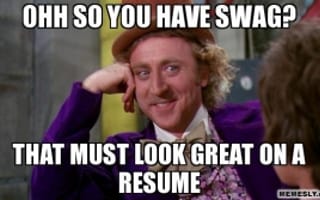Whether you have just graduated from college, or you have been a loyal employee of 5 years and your interviewing skills are a little rusty, here are a few tips that will help get you in front of more of the companies you’re interested in.
Let’s be real. The following suggestions only scratch the surface. But having worked with candidates ranging from recent graduates through VPs of Sales over the last few years, these are some common mistakes that candidates make. This first post is in regards to everything pre-interview.
Next week, after you have strategically applied to all the jobs you’re interested in, I’ll give you tips on how to woo them once you’re through the door.
A good place to start is with resumes and cover letters.
No paragraphs. Though this tip is most relevant for sales resumes, it can be applied to a number of different industries. It’s hard on the eyes and with so much content, it’s easy for a reader to accidentally glance over some of the points you might personally consider most important.
Bullet points allow for people to assess your experience and performance quickly and efficiently without having to sift through additional flowery language that though sometimes beautifully written, isn’t essential.
Include tangible experience in every bullet point. Managed a number of key accounts from onboarding through client lifecycle is exceptionally vague compared to Managed approximately 50 key accounts including Reebok, Tesla & Sears from onboarding through an annual client lifecycle
Never mass send your resume to numerous roles within a company. It suggests that you haven’t taken the time to consider which opportunity most closely aligns with your aspirations, nor taken the time to figure out which position aligns with your specific experience. It doesn’t suggest abundant interest in a company. It’s just plain lazy.
Cover letters are often optional but if you choose to send one, never send a template. You’re better off sending no cover letter at all than a cover letter that has no content specific to the organization you applied to. Again, it’s just plain lazy.
But if optional, why send a cover letter? Beyond expressing interest in that company in particular, hiring directors absolutely need to see a cover letter in 4 specific scenarios:
Industry/Role Shift - Without a cover letter, directors assume you looked at the experience requirements and ignored them, or you never looked at the experience requirements at all
Relocation - Without a cover letter, directors assume you didn’t bother to look at the job location, or you’re applying all over the country just to see what sticks
A gap in your resume - Perhaps you went bak to school or you spent a year volunteering in Myanmar. By not speaking to that on your resume or in a cover letter, it just looks like you have been out of work and unable or uninterested in getting a job for an extended period of time.
Hoppiness - Brief stints of time with a few companies back to back is majorly concerning to hiring directors. Sometimes things are out of your control and in these instances, it's essential you point this out. Otherwise readers might perceive those transitions as a result of one of the following:
Shopping around between opportunities
Not being a good fit culturally
Not hitting sales goals
Failing to learn from mistakes made in choosing previous positions
Inability to decide on the “proper” profession
You did all these things but they still passed on your resume. What red flags might there have been?
Lack of attention to detail on your resume. This is obvious. Watch out for typos. Use the same type of font throughout and have consistency in regards to bullet point placements and use of bold or italics.
Few LinkedIn Connections. They drilled this home during college and I didn’t take it to heart, but I sure look at it now. LinkedIn makes it so easy to build out your network by making suggestions around people you went to school with, folks you worked with, and every second degree connection you could possibly look to connect with. By building out your network, you’re gaining access to thought leaders and professionals that you can learn from. By not building out your network, it suggests that you aren’t utilizing all the tools you could to make an informed decision in finding a new job.
A bad LinkedIn photo or lack of photo at all. Don’t we all have a “photographer friend” nowadays? Either ask one of them to take your photo or strategically crop a Facebook photo of yours. Maybe ask your crush to pick their favorite. You want a photo that looks professional, confident and friendly.
Appearance of lack of upward movement within professional experience. Hiring directors often become concerned if there appears to have been no sign of upward movement or additional responsibility within your roles. Having title changes alongside additional responsibility make this a little easier to point to but sometimes companies don’t provide title changes so loosely.
In those cases, use your resume to demonstrate the growth you did experience. This can get tricky and messy but hopefully this mock-up gives you an idea of what you might be able to do:

Having incorporated all of these details and this level of clarity - throughout cover letters, resumes and your LinkedIn page - you’re well on your way to landing an initial phone screen or on-site.
Stay tuned until next week for the interview tips you wish you’d been taught a long time ago.



